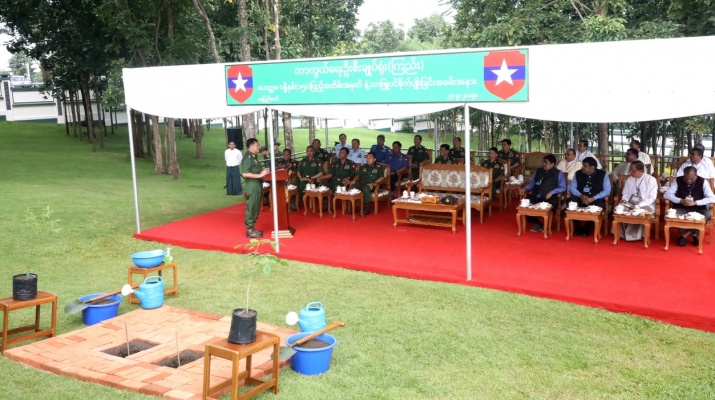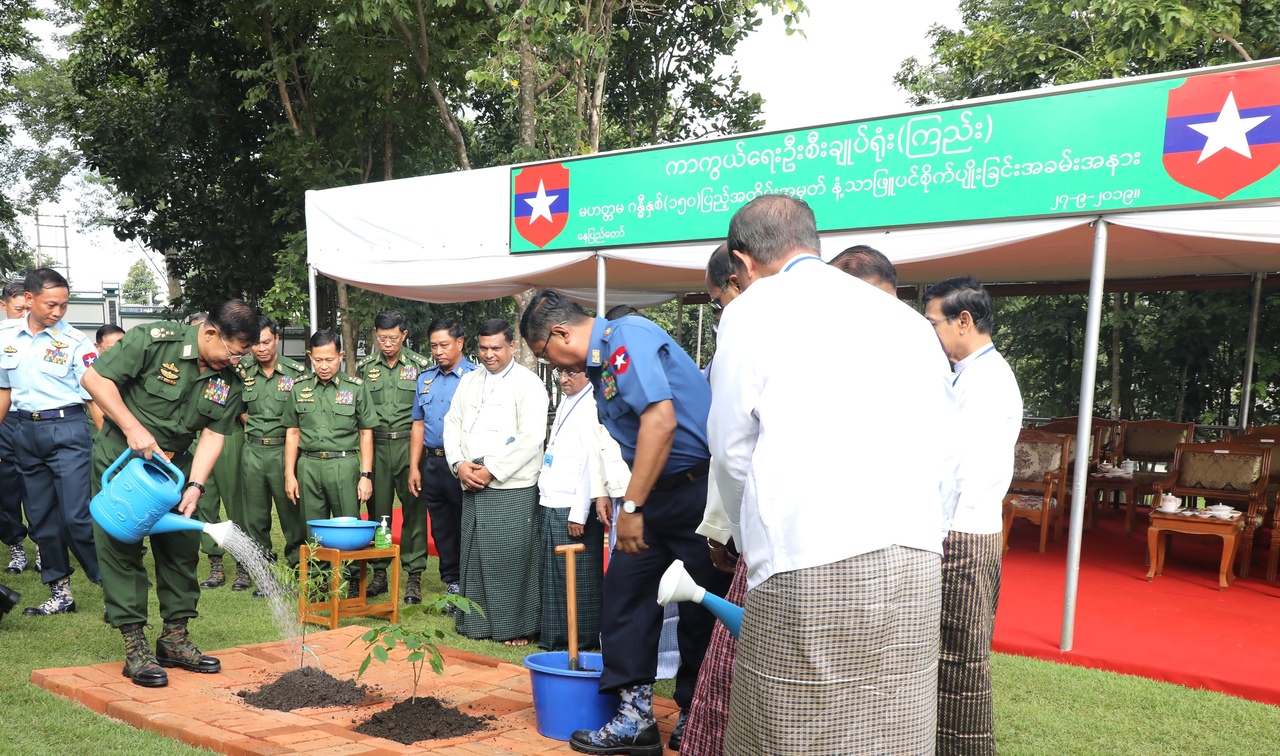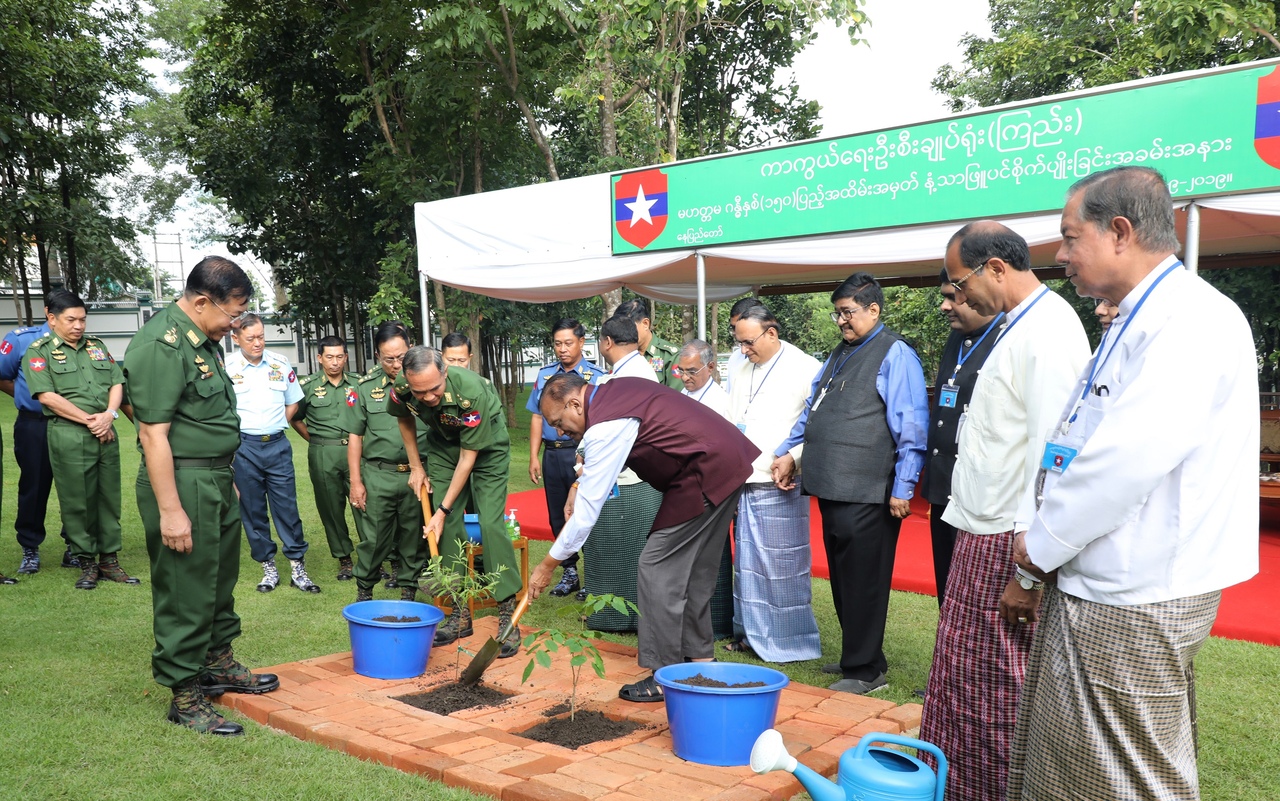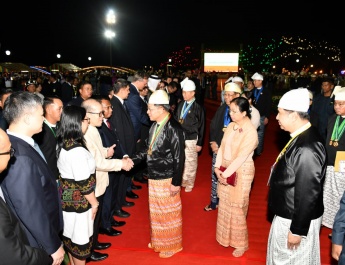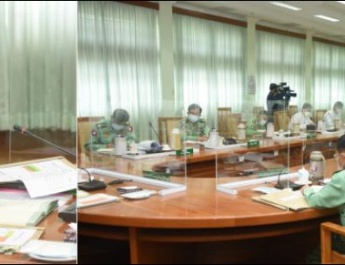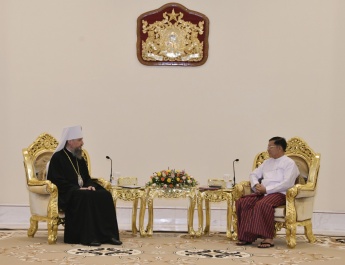NAYPYI TAW September 27
Every year, the international community holds commemorative ceremonies on a grand scale on the International Day of Non-Violence marked by the United Nations on 2 October, the birthday of Mahatma Gandhi, the pioneer of global peace, in 2007. Myanmar has been planting sandalwood in honour of the 150th birth anniversary of Mahatma Gandhi which falls on 2 October this year. This morning,Commander-in-Chief of Defence Services Senior General Min Aung Hlaing and party collectively planted a sandalwood tree as a gesture marking the 150th birthday of Mahatma Gandhi at the venue near Hsinbyutaw Yeiktha of the Office of the Commander-in-Chief.
Also present on the occasion were Deputy Commander-in-Chief of Defence Services Commander-in-Chief(Army) Vice-Senior General Soe Win, the Union Minister for Home Affairs, the Union Minister for Defence, the Union Minister for Border Affairs, the Chief of the General Staff (Army, Navy and Air), the Commander-in-Chief(Navy), the Commander-in-Chief(Air), senior military officers of the Office of the Commander-in-Chief(Army, Navy and Air), Chairman of the committee to hold the 150th birthday celebrations of Mahatma Gandhi U Maung Shwe and members and officials.
On arrival at the venue, the Senior General and party were welcomed by the committee chairman and members.
Senior General Min Aung Hlaing delivered an address. He said India and Myanmar are good friends having similar history and traditions and culture. Whenever the name “Mahatma Gandhi” is heard he is seen as the momentous symbol of global peace who embraced non-violent principles of weapon-less struggle and frugal living habit in leading the independence struggle of India. As Mahatma Gandhi was born on 2 October 1869, the 2nd of October this year is his 150th birthday. During Myanmar’s independence struggle, Gandhi visited the country for three times in 1902, 1915 and 1929, and met with political leaders and Buddhist monks of the independence struggle on the platform of Shwedagon Pagoda and spoke words of encouragement, which generated extra strength for Myanmar’s independence struggle. When the Myanmar’s independence leader Bogyoke Aung San was assassinated in July 1947, Mahatma Gandhi led the special memorial service.Holding those commemorations is aimed at valuing Gandhi’s peace concept and maintaining good historical tradition. His behaviours must be copied. The Senior General expressed his delight in having the chance to plant a sandalwood tree in commemoration of Gandhi’s 150th birthday. He then made a wish for the lasting friendship between Myanmar and India and regional and global peace by copying Gandhi’s peace and non-violence concepts.
Speaking words of thanks,U Khin Maung Cho, member of the committee for organizing the event, said Mahatma Gandhi was born on 2 October 1869 in Porbandar, Gujarat State, western India. In 1876, he went to Rajgaon to pursue education. After passing matriculation in 1887, he studied law in London, Britain. He obtained a law degree in 1891 and served as an advocate in India. While working in South Africa, he tried his best for the elimination of discrimination against colour in 1893. He systematically organized India National Congress in 1915 and endeavoured for independence. Employing non-violent resistance,he encouraged exercise offreedom from fear, self-reliance and unity.Under his leadership and thanks to Indian people’s unity, independence was regained on 15 August 1947. Hailing his concepts and ideas, the United Nations designated 2 October as International Day of Non-Violence in 2007, which is annually held across the world. U Khin Maung Cho expressed thanks to the Commander-in-Chief of Defence Services for organizing a sandalwood-growing ceremony in the compound of the Office of the Commander-in-Chief (Army)in commemoration of Gandhi’s 150th birthday. He made a wish for further cementing the bilateral friendship in honour of peace leader Mahatma Gandhi.
Then, the Senior General and party planted a sandalwood and padauk trees and posed for documentary photo together with those present.


